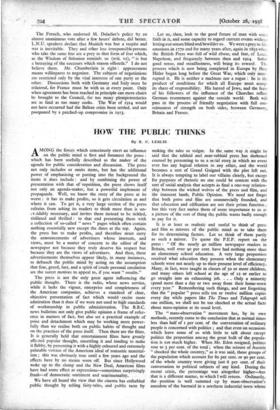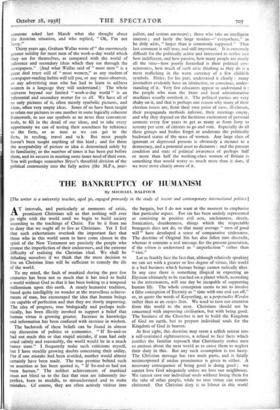HOW THE PUBLIC THINKS
By S. C. LESLIE
AMONG the forces which consciously exert an influence on the public mind is first and foremost the press : which has been usefully described as the maker of the agenda for public consideration and discussion. The press not only includes or omits items, but has the additional power of emphasising or putting into the background the items it does include : and by combining the power of presentation with that of repetition, the press shows itself not only an agenda-maker, but a powerful implement of propaganda. Well, we know the story of the press at its worst : it has to make profits, so it gets circulation as and where it can. To get it, a very large section of the press refrains from asking its readers to think more than is un- v.)idably necessary, and invites them instead to be tickled, titillated and thrilled : to that end presenting them with a collection of so-called " news " pages which often contain nothing essentially new except the dates at the top. Again, the press has to make profits, and therefore must carry the announcements of advertisers whose interests, and views, must be a matter of concern to the editor of the newspaper not because they truly deserve his respect but because they are the views of advertisers. And then, these advertisements themselves appear likely, in many instances, to debauch the public mind by acting on the assumption that fear, greed, lust, and a spirit of crude personal emulation are the surest motives to appeal to, if you want " results."
The press is not the only great agent influencing the public thought. There is the radio, whose news service, while it lacks the vigour, enterprise and completeness of the American companies, achieves a standard of clear, objective presentation of fact which would • excite more admiration than it does if we were not used to high standards of workmanship in public administration. The B.B.C. news bulletins not only give public opinion a frame of refer- ence in matters of fact, but also set a practical example of poise and detachment which may be working more power- fully than we realise both on public habits of thought and on the practices of the press itself. Then there are the films. It is generally held that entertainment films have greatly affected popular thought, unsettling it and tending to make it flabby, by presenting it with a highly coloured and extremely palatable version of the American ideal of romantic material- ism ; this was obviously true until a few years ago and the effects have by no means worn off. But since Hollywood woke up to the slump and the New Deal, American films have had some effect as expressions—sometimes surprisingly frank—of democratic sentiment and sentimentality.
We have all heard the view that the cinema has enfeebled public thought by telling fairy-tales, and public taste by making the tales so vulgar. In the, same way it might be said that the tabloid and near-tabloid press has darkened counsel by presenting to us a serial story in which no event ever has any logical relation to any other, and the world becomes a sort of Grand Guignol with the plot left out. It is always tempting to label our villains clearly, but except for purposes of rhetoric no one could be content with the sort of social analysis that accepts as final a one-way relation- ship between the wicked wolves of the press and film, and the innocent lamb, Public Opinion. We heed not forget that both press and film are commercially founded, and that education and edification are not their prime function , but this very fact makes them of some importance to us as a picture of the sort of thing the public wants badly enough to pay for it.
It is at least as realistic and useful 'to think of press and film as mirrors of the public mind as to take them for its determining factors. Let us think of them partly as such a mirror. To quote the P.E.P. report on the press : " Of the nearly 4o million newspaper readers in Britain, well over 90 per cent. have had nothing more than an elementary school education. A very large proportion received what education they possess when the elementary schools were not nearly up to their present level of efficiency. Many, in fact, were taught in classes of 5o or more children, and many others left school at the age of 12 or earlier to go straight into an exhausting job. . . . Only a minority spend more than a day or two away from their home-town every year." Remembering such things, and not forgetting that the " popular " press sells ten or twelve million copies every day while papers like The Times and Telegraph sell one million, we shall not be too shocked at the actual facts about mass-opinion at its usual level.
The " mass-observation " movement has, by its own methods, recently come to the conclusion that at normal times less than half oft per cent. of the conversation of ordinary people is concerned with politics ; and that even on occasions which leave some of us with little to talk about except politics the proportion among the great bulk of the popula- tion is not much higher. When Mr. Eden resigned, politics rose to 3 per cent. of the total ; when the seizure of Austria " shocked the whole country," as it was said, those groups of the population which account for 8o per cent. or 90 per cent. of the whole country were giving just 6 per cent. of their conversation to political subjects of any kind. During the recent crisis, the percentage was altogether higher—but that is a different matter, to which I will return. Ordinarily, the position is well summed up by mass-observation's anecdote of the barmaid in a northern industrial town whom someone asked last -March what she thought about the Austrian situation, and who replied, " Oh, I'm not fussy."
Thirty years ago, Graham Wallas wrote of " the enormously greater solidity for most men of the work-a-day world which they see for. themselves, as compared with the world of inference and secondary ideas which they see through - the newspapers." . (And what _Wallas_ said of " most men " is a great deal truer still of " most women," as any student of newspaper-reading habits will tell you, or any mass-observer, or any advertising man who has had to learn to address women in a language they will understand.) The whole universe beyond our limited " work-a-day world " is an inferential and secondary miner for us all. We have all of us only pictures of it, often merely. symbolic pictures, and ideas,-often very empty ideas. Some of us have been taught to relate our pictures to one another in some logically coherent framework, to use our symbols as no more than convenient tools, to fill in the detail of our ideas, and to take every opportunity we can of testing their soundness by reference to the facts, or as near as we can get to the facts, in reading, travel and task. But most people haven't been taught anything of this kind ; and for them the acceptability of picture or idea is determined solely by its familiarity, or the number of times it has been put before them, and its success in meeting some inner need of their own. You will perhaps remember Bryce's threefold division of the political community into the fully active (like M.P.s, jour- nalistS, and serious amateurs) ; those who take an intelligent interest ; and lastly the large residue—" everywhere," as he drily adds, " larger than is commonly supposed." That last comment is still true, and still important. It is extremely difficult for the politically active and interested to realise just how indifferent, and how passive, how many people are nearly . all the time—how poorly furnished is their political con- sciousness, how much of such civic thinking as they do is a mere trafficking in the worn currency of a few childish symbols. Hitler, for his part, understood it clearly : many journalists evidently have an instinctive, or conscious, under- standing of it. Very few educators appear to understand it : the people who man the State and local administrative machines usually overlook it. The political parties are very shaky on it, and that is perhaps one reason why many of their election issues are, from their own point of view, ill-chosen, their propaganda methods inferior, their meetings empty, and why they depend on the factitious excitement of personal contests every few years to get as many as from forty to seventy per cent. of citizens to go and vote. Especially do all these groups and bodies forget or underrate the politically backward status of the mass of women. Any large class of ignorant or depressed persons is obviously a menace to a democracy, and a potential asset to dictators : and the present condition and state of political awareness of perhaps half or more than half the working-class women of Britain is something that would worry us much more than it does, if we were more clearly aware of it.

























































 Previous page
Previous page